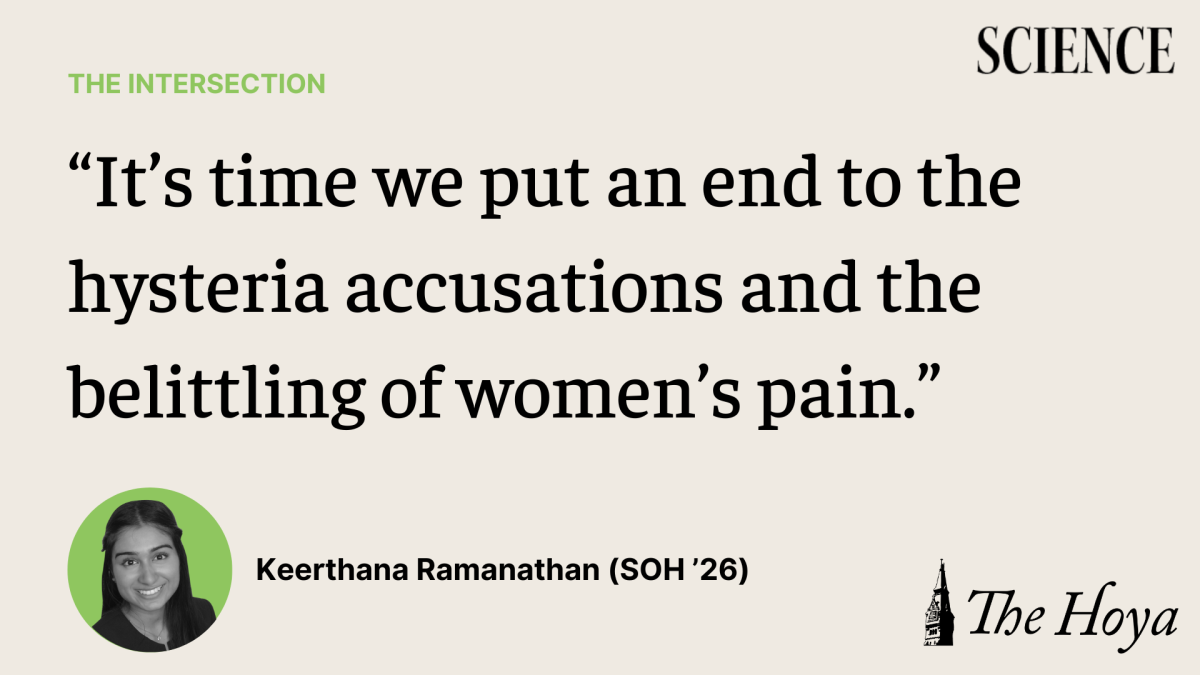“‘Oppenheimer’ is based on a 721-page Pulitzer Prize-winning book about the Manhattan Project, and ‘Barbie’ is on a plastic doll with big boobies.”
One of the most infamous lines in the unfunny monologue comedian Jo Koy delivered at the 2024 Golden Globes unintentionally underlined the sexism portrayed in the Barbie movie, and quite perfectly highlighted what many argue was the entire point of the film. However, when people stormed social media in backlash, women were accused of being “too sensitive” or even hysterical.
The Merriam-Webster dictionary defines hysteria as “a psychoneurosis marked by emotional excitability and disturbances of the psychogenic, sensory, vasomotor, and visceral function.” Now commonly equated with insanity, the word hysteria has important implications when it comes to the way women are portrayed, especially when it comes to women’s experiences of pain. To understand the impact hysteria has had on women’s health, we must go back to its root — literally.
The word hysteria is believed to come from the Greek word hysterikos, which has been translated into various definitions, including “movement or wandering of the womb.” The root of the word, hystero, refers to the uterus. Therefore, the origin of the word hysteria derives from the idea that the “movement or wandering” of the uterus was the cause of women’s pain, which modern experts believe applies to menstrual pain or disorders. In the 17th century, however, the focus of the word hysteria shifted to define the brain, rather than the uterus, which was when the word became associated with the current meaning: insanity. Its connection to medical diagnoses, however, has remained untouched and “hysteria” now becomes a way to ignore or dismiss the pain of women.
Study after study suggests this very fact. One study shows that men presenting with abdominal pain waited an average of 49 minutes before receiving pain treatment, whereas women presenting with identical symptoms, had to wait an average of 65 minutes. Was it because the women’s pain was caused by their “wandering uteruses?” Even after major procedures like heart surgery, women are still significantly less likely to receive painkillers than their male counterparts. We can’t make the “wandering uterus” argument here.
The core of the issue lies in the controversial history of gynecology. A landmark 1949 study in obstetrics examined whether women truly feel pain during childbirth or if they are simply hysterical. Researchers concluded that women do, in fact, feel pain during childbirth. Though it seems like a truism now, this study was groundbreaking for the field of women’s health. Prior to this study, it was believed that women did not feel pain the same way that men do, an enduring legacy of James Marion Sims, as discussed in a previous edition of “The Intersection.” For example, women are commonly told during an intrauterine device (IUD) insertion procedure that they will simply feel “a pinch.” However, to many, it is an incredibly painful experience. This underscores the complete disconnect between the pain women truly do feel and the way male doctors perceive it.
Monica Wang, a professor of community health at Boston University, puts forth several multifaceted solutions to recognize and improve this pain management disparity in a 2023 commentary. It requires “broader systemic and structural changes to improve patient outcomes,” including techniques that encompass both policy and healthcare changes, according to Wang. Her proposed interventions include standardizing pain assessment tools and training, investing in women’s health research to inform change and advocating for structural policies centered on accessibility and equity that promote pain management care for women, regardless of their insurance status.
It’s time we put an end to the hysteria accusations and the belittling of women’s pain.









